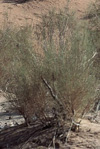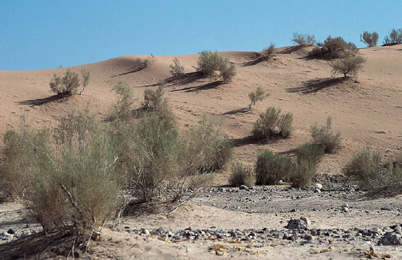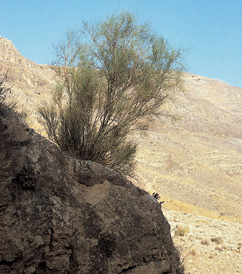

Broom survives in arid regions.
THE BROOM BUSH THAT THE depressed Elijah sat under is common near Beersheba, the locale the prophet fled to after being threatened by the evil Queen Jezebel: “So Jezebel sent this message to Elijah: ‘May the gods strike me and even kill me if by this time tomorrow I have not killed you just as you killed them’” (I Kings 19:2–4a, NLT). Elijah was afraid and fled for his life. He went to Beersheba, a town in Judah, and he left his servant there. Then he went on alone into the wilderness, traveling all day. He sat down under a solitary broom tree and prayed that he might die. “I have had enough, LORD,” he said. “Take my life, for I am no better than my ancestors who have already died.”
Called “juniper” in the KJV, the white broom, Retama raetam, is a member of the bean family and is unrelated to juniper, Juniperus, a genus of gymnosperms that is infrequent in the desert.
White broom is one of the most common plants in deserts and other arid regions of the Middle East. The many tall (up to 3 meters, 9 feet), slim stems arising from the woody base bear small leaves for only a short time during the rainy season. Attractive masses of white flowers are borne at the end of the winter. With no leaves on the plant, the flowers are especially conspicuous. The entire plant is toxic (el Bahri et al. 1999).
The underground portions of the shrub are an excellent source of charcoal that produces an exceptionally hot flame. This use is mentioned in Psalm 120:3–4: “What will he do to you, and what more besides, O deceitful tongue? He will punish you with a warrior’s sharp arrows, with burning coals of the broom tree” (NIV); and perhaps also referred to in Job 30:4: “They used to pick saltwort among the scrub, making their meals off roots of broom” (NJB). The Job passage is often translated as food from the broom tree, which is unlikely because of its toxicity. Rather, the meaning must lie in the use of the broom root as fuel. Because of its beauty and ability to survive under difficult conditions, rotem, as the white broom is called in Hebrew, is used as a girl’s name in Israel.

Broom bushes in the dunes of the Wadi Arabah of Jordan. The shrubs have leaves in this picture, taken in December.

This broom shrub near Jericho is beginning to lose it leaves, a mechanism of water conservation during the hot, dry summer.
Broom, like carob, is an example of a plant widely distributed in arid and semiarid areas but rare in holy writ.